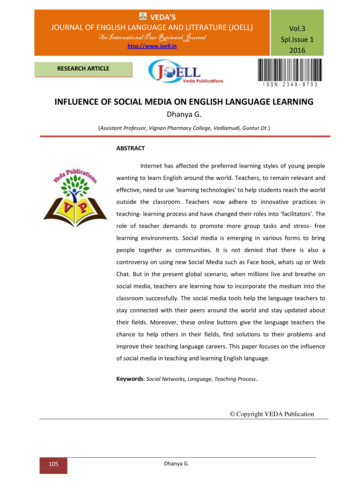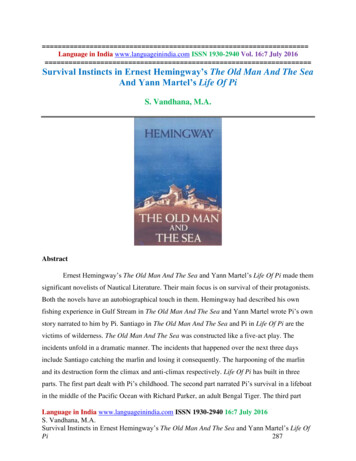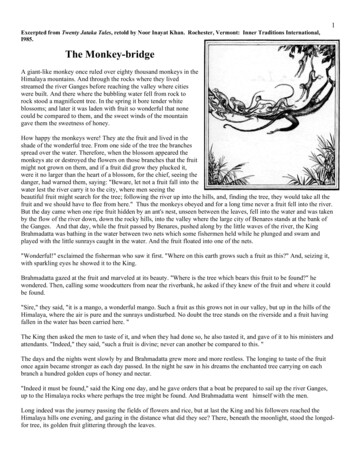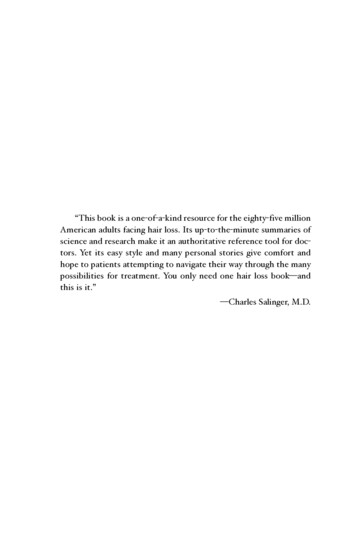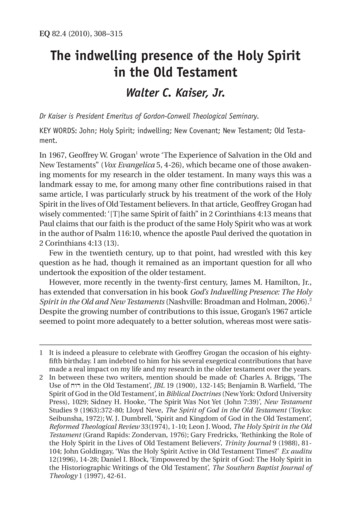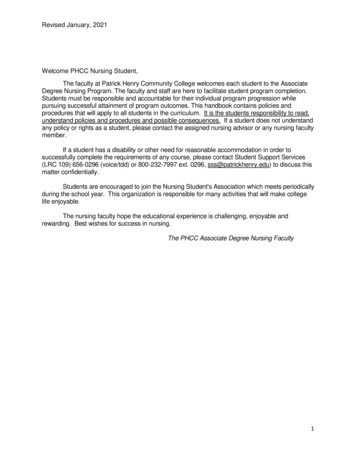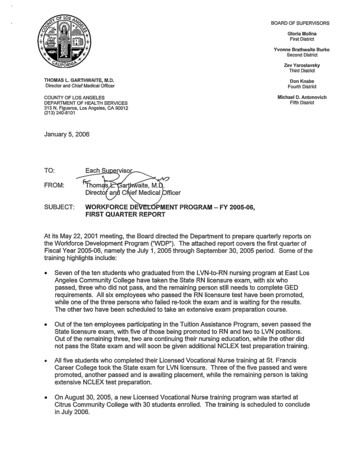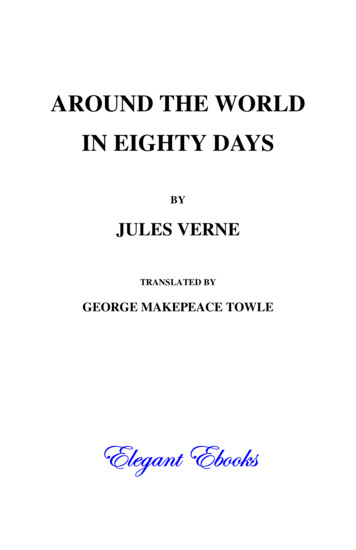
Transcription
AROUND THE WORLDIN EIGHTY DAYSBYJULES VERNETRANSLATED BYGEORGE MAKEPEACE TOWLE7 WYS f f 77 T a a ] e
COPYRIGHT INFORMATIONBook: Around the World in Eighty DaysAuthor: Jules Verne, 1828–1905Translator: George Makepeace Towle, 1841–1893First published: 1873This ebook contains the text of George Towle’s Englishtranslation of Le Tour du Monde en Quatre-Vingts Jours. (Afew errors have been corrected and are marked by footnotessigned “J.M.”) The original book is in the public domain inthe United States and in most, if not all, other countries aswell. Readers outside the United States should check theirown countries’ copyright laws to be certain they can legallydownload this ebook. The Online Books Page has an FAQwhich gives a summary of copyright durations for manyother countries, as well as links to more official sources.This PDF ebook wascreated by José Menéndez.
CONTENTSI. In which Phileas Fogg and Passepartout accept eachother, the one as master, the other as manII. In which Passepartout is convinced that he has at lastfound his idealIII. In which a conversation takes place which seems likelyto cost Phileas Fogg dearIV. In which Phileas Fogg astounds Passepartout, hisservantV. In which a new species of funds, unknown to themoneyed men, appears on ’ChangeVI. In which Fix, the detective, betrays a very naturalimpatienceVII. Which once more demonstrates the uselessness ofpassports as aids to detectivesVIII. In which Passepartout talks rather more, perhaps, thanis prudentIX. In which the Red Sea and the Indian Ocean provepropitious to the designs of Phileas FoggX. In which Passepartout is only too glad to get off with theloss of his shoesXI. In which Phileas Fogg secures a curious means ofconveyance at a fabulous priceXII. In which Phileas Fogg and his companions ventureacross the Indian forests, and what ensued
XIII. In which Passepartout receives a new proof thatfortune favours the braveXIV. In which Phileas Fogg descends the whole length ofthe beautiful valley of the Ganges without everthinking of seeing itXV. In which the bag of bank-notes disgorges somethousands of pounds moreXVI. In which Fix does not seem to understand in the leastwhat is said to himXVII. Showing what happened on the voyage fromSingapore to Hong KongXVIII. In which Phileas Fogg, Passepartout, and Fix go eachabout his businessXIX. In which Passepartout takes a too great interest in hismaster, and what comes of itXX. In which Fix comes face to face with Phileas FoggXXI. In which the master of the Tankadere runs great riskof losing a reward of two hundred poundsXXII. In which Passepartout finds out that, even at theantipodes, it is convenient to have some money inone’s pocketXXIII. In which Passepartout’s nose becomes outrageouslylongXXIV. During which Mr. Fogg and party cross the PacificOcean
XXV. In which a slight glimpse is had of San FranciscoXXVI. In which Phileas Fogg and party travel by thePacific RailroadXXVII. In which Passepartout undergoes, at a speed oftwenty miles an hour, a course of MormonhistoryXXVIII. In which Passepartout does not succeed in makinganybody listen to reasonXXIX. In which certain incidents are narrated which areonly to be met with on American railroadsXXX. In which Phileas Fogg simply does his dutyXXXI. In which Fix the detective considerably furthers theinterests of Phileas FoggXXXII. In which Phileas Fogg engages in a direct strugglewith bad fortuneXXXIII. In which Phileas Fogg shows himself equal to theoccasionXXXIV. In which Phileas Fogg at last reaches LondonXXXV. In which Phileas Fogg does not have to repeat hisorders to Passepartout twiceXXXVI. In which Phileas Fogg’s name is once more at apremium on ’ChangeXXXVII. In which it is shown that Phileas Fogg gainednothing by his tour around the world, unless itwere happiness
CHAPTER IIn which Phileas Fogg and Passepartout accepteach other, the one as master, the other as manMR. PHILEAS FOGG lived, in 1872, at No. 7, SavilleRow, Burlington Gardens, the house in whichSheridan died in 1814. He was one of the mostnoticeable members of the Reform Club, though he seemedalways to avoid attracting attention; an enigmatical personage,about whom little was known, except that he was a polishedman of the world. People said that he resembled Byron,—atleast that his head was Byronic; but he was a bearded,tranquil Byron, who might live on a thousand years withoutgrowing old.Certainly an Englishman, it was more doubtful whetherPhileas Fogg was a Londoner. He was never seen on’Change, nor at the Bank, nor in the counting-rooms of the“City;” no ships ever came into London docks of which hewas the owner; he had no public employment; he had neverbeen entered at any of the Inns of Court, either at theTemple, or Lincoln’s Inn, or Gray’s Inn; nor had his voiceever resounded in the Court of Chancery, or in the Exchequer,or the Queen’s Bench, or the Ecclesiastical Courts. Hecertainly was not a manufacturer; nor was he a merchant or agentleman farmer. His name was strange to the scientific andlearned societies, and he never was known to take part in thesage deliberations of the Royal Institution or the London7
Institution, the Artisan’s Association or the Institution ofArts and Sciences. He belonged, in fact, to none of thenumerous societies which swarm in the English capital, fromthe Harmonic to that of the Entomologists, founded mainlyfor the purpose of abolishing pernicious insects.Phileas Fogg was a member of the Reform, and that wasall.The way in which he got admission to this exclusiveclub was simple enough.He was recommended by the Barings, with whom hehad an open credit. His checks were regularly paid at sightfrom his account current, which was always flush.Was Phileas Fogg rich? Undoubtedly. But those whoknew him best could not imagine how he had made hisfortune, and Mr. Fogg was the last person to whom to applyfor the information. He was not lavish, nor, on the contrary,avaricious; for whenever he knew that money was needed fora noble, useful, or benevolent purpose, he supplied itquickly, and sometimes anonymously. He was, in short, theleast communicative of men. He talked very little, andseemed all the more mysterious for his taciturn manner. Hisdaily habits were quite open to observation; but whatever hedid was so exactly the same thing that he had always donebefore, that the wits of the curious were fairly puzzled.Had he travelled? It was likely, for no one seemed toknow the world more familiarly; there was no spot sosecluded that he did not appear to have an intimateacquaintance with it. He often corrected, with a few clearwords, the thousand conjectures advanced by members of theclub as to lost and unheard-of travellers, pointing out the trueprobabilities, and seeming as if gifted with a sort of secondsight, so often did events justify his predictions. He musthave travelled everywhere, at least in the spirit.8
It was at least certain that Phileas Fogg had notabsented himself from London for many years. Those whowere honoured by a better acquaintance with him than therest, declared that nobody could pretend to have ever seenhim anywhere else. His sole pastimes were reading thepapers and playing whist. He often won at this game, which,as a silent one, harmonized with his nature; but his winningsnever went into his purse, being reserved as a fund for hischarities. Mr. Fogg played, not to win, but for the sake ofplaying. The game was in his eyes a contest, a struggle witha difficulty, yet a motionless, unwearying struggle, congenialto his tastes.Phileas Fogg was not known to have either wife orchildren, which may happen to the most honest people;either relatives or near friends, which is certainly moreunusual. He lived alone in his house in Saville Row, whithernone penetrated. A single domestic sufficed to serve him. Hebreakfasted and dined at the club, at hours mathematicallyfixed, in the same room, at the same table, never taking hismeals with other members, much less bringing a guest withhim; and went home at exactly midnight, only to retire atonce to bed. He never used the cosy chambers which theReform provides for its favoured members. He passed tenhours out of the twenty-four in Saville Row, either insleeping or making his toilet. When he chose to take a walk,it was with a regular step in the entrance hall with its mosaicflooring, or in the circular gallery with its dome supported bytwenty red porphyry Ionic columns, and illumined by bluepainted windows. When he breakfasted or dined, all theresources of the club—its kitchens and pantries, its butteryand dairy—aided to crowd his table with their mostsucculent stores; he was served by the gravest waiters, indress coats, and shoes with swan-skin soles, who profferedthe viands in special porcelain, and on the finest linen; club9
decanters, of a lost mould, contained his sherry, his port, andhis cinnamon-spiced claret; while his beverages wererefreshingly cooled with ice, brought at great cost from theAmerican lakes.If to live in this style is to be eccentric, it must beconfessed that there is something good in eccentricity!The mansion in Saville Row, though not sumptuous,was exceedingly comfortable. The habits of its occupantwere such as to demand but little from the sole domestic; butPhileas Fogg required him to be almost superhumanlyprompt and regular. On this very 2nd of October he haddismissed James Forster, because that luckless youth hadbrought him shaving-water at eighty-four degrees Fahrenheitinstead of eighty-six; and he was awaiting his successor, whowas due at the house between eleven and half-past.Phileas Fogg was seated squarely in his arm-chair, hisfeet close together like those of a grenadier on parade, hishands resting on his knees, his body straight, his head erect;he was steadily watching a complicated clock whichindicated the hours, the minutes, the seconds, the days, themonths, and the years. At exactly half-past eleven Mr. Foggwould, according to his daily habit, quit Saville Row, andrepair to the Reform.A rap at this moment sounded on the door of the cosyapartment where Phileas Fogg was seated, and JamesForster, the dismissed servant, appeared.“The new servant,” said he.A young man of thirty advanced and bowed.“You are a Frenchman, I believe,” asked Phileas Fogg,“and your name is John?”“Jean, if monsieur pleases,” replied the new-comer,“Jean Passepartout, a surname which has clung to mebecause I have a natural aptness for going out of onebusiness into another. I believe I’m honest, monsieur, but, to10
be outspoken, I’ve had several trades. I’ve been an itinerantsinger, a circus-rider, when I used to vault like Leotard, anddance on a rope like Blondin. Then I got to be a professor ofgymnastics, so as to make better use of my talents; and then Iwas a sergeant fireman at Paris, and assisted at many a bigfire. But I quitted France five years ago, and, wishing to tastethe sweets of domestic life, took service as a valet here inEngland. Finding myself out of place, and hearing thatMonsieur Phileas Fogg was the most exact and settledgentleman in the United Kingdom, I have come to monsieurin the hope of living with him a tranquil life, and forgettingeven the name of Passepartout.”“Passepartout suits me,” responded Mr. Fogg. “You arewell recommended to me; I hear a good report of you. Youknow my conditions?”“Yes, monsieur.”“Good. What time is it?”“Twenty-two minutes after eleven,” returnedPassepartout, drawing an enormous silver watch from thedepths of his pocket.“You are too slow,” said Mr. Fogg.“Pardon me, monsieur, it is impossible—”“You are four minutes too slow. No matter; it’s enoughto mention the error. Now from this moment, twenty-nineminutes after eleven, a.m., this Wednesday, October 2nd,you are in my service.”Phileas Fogg got up, took his hat in his left hand, put iton his head with an automatic motion, and went off withouta word.Passepartout heard the street door shut once; it was hisnew master going out. He heard it shut again; it was hispredecessor, James Forster, departing in his turn.Passepartout remained alone in the house in Saville Row.11
CHAPTER IIIn which Passepartout is convincedthat he has at last found his ideal“FAITH,” muttered Passepartout, somewhat flurried,“I’ve seen people at Madame Tussaud’s as lively asmy new master!”Madame Tussaud’s “people,” let it be said, are of wax,and are much visited in London; speech is all that is wantingto make them human.During his brief interview with Mr. Fogg, Passepartouthad been carefully observing him. He appeared to be a manabout forty years of age, with fine, handsome features, and atall, well-shaped figure; his hair and whiskers were light, hisforehead compact and unwrinkled, his face rather pale, histeeth magnificent. His countenance possessed in the highestdegree what physiognomists call “repose in action,” a qualityof those who act rather than talk. Calm and phlegmatic, witha clear eye, Mr. Fogg seemed a perfect type of that Englishcomposure which Angelica Kauffmann has so skilfullyrepresented on canvas. Seen in the various phases of hisdaily life, he gave the idea of being perfectly well-balanced,as exactly regulated as a Leroy chronometer. Phileas Foggwas, indeed, exactitude personified, and this was betrayedeven in the expression of his very hands and feet; for in men,as well as in animals, the limbs themselves are expressive ofthe passions.12
He was so exact that he was never in a hurry, wasalways ready, and was economical alike of his steps and hismotions. He never took one step too many, and always wentto his destination by the shortest cut; he made no superfluousgestures, and was never seen to be moved or agitated. Hewas the most deliberate person in the world, yet alwaysreached his destination at the exact moment.He lived alone, and so to speak, outside of every socialrelation; and as he knew that in this world account must betaken of friction, and that friction retards, he never rubbedagainst anybody.As for Passepartout, he was a true Parisian of Paris.Since he had abandoned his own country for England, takingservice as a valet, he had in vain searched for a master afterhis own heart. Passepartout was by no means one of thosepert dunces depicted by Molière, with a bold gaze and a noseheld high in the air; he was an honest fellow, with a pleasantface, lips a trifle protruding, soft-mannered and serviceable,with a good round head, such as one likes to see on theshoulders of a friend. His eyes were blue, his complexionrubicund, his figure almost portly and well-built, his bodymuscular, and his physical powers fully developed by theexercises of his younger days. His brown hair was somewhattumbled; for while the ancient sculptors are said to haveknown eighteen methods of arranging Minerva’s tresses,Passepartout was familiar with but one of dressing his own:three strokes of a large-tooth comb completed his toilet.It would be rash to predict how Passepartout’s livelynature would agree with Mr. Fogg. It was impossible to tellwhether the new servant would turn out as absolutelymethodical as his master required; experience alone couldsolve the question. Passepartout had been a sort of vagrant inhis early years, and now yearned for repose; but so far he hadfailed to find it, though he had already served in ten English13
houses. But he could not take root in any of these; withchagrin, he found his masters invariably whimsical andirregular, constantly running about the country, or on thelook-out for adventure. His last master, young LordLongferry, Member of Parliament, after passing his nights inthe Haymarket taverns, was too often brought home in themorning on policemen’s shoulders. Passepartout, desirous ofrespecting the gentleman whom he served, ventured a mildremonstrance on such conduct; which being ill received, hetook his leave. Hearing that Mr. Phileas Fogg was lookingfor a servant, and that his life was one of unbrokenregularity, that he neither travelled nor stayed from homeovernight, he felt sure that this would be the place he wasafter. He presented himself, and was accepted, as has beenseen.At half-past eleven, then, Passepartout found himselfalone in the house in Saville Row. He began its inspectionwithout delay, scouring it from cellar to garret. So clean,well-arranged, solemn a mansion pleased him; it seemed tohim like a snail’s shell, lighted and warmed by gas, whichsufficed for both these purposes. When Passepartout reachedthe second story, he recognized at once the room which hewas to inhabit, and he was well satisfied with it. Electricbells and speaking-tubes afforded communication with thelower stories; while on the mantel stood an electric clock,precisely like that in Mr. Fogg’s bedchamber, both beatingthe same second at the same instant. “That’s good, that’lldo,” said Passepartout to himself.He suddenly observed, hung over the clock, a cardwhich, upon inspection, proved to be a programme of thedaily routine of the house. It comprised all that was requiredof the servant, from eight in the morning, exactly at whichhour Phileas Fogg rose, till half-past eleven, when he left thehouse for the Reform Club,—all the details of service, the14
tea and toast at twenty-three minutes past eight, the shavingwater at thirty-seven minutes past nine, and the toilet attwenty minutes before ten. Everything was regulated andforeseen that was to be done from half-past eleven a.m. tillmidnight, the hour at which the methodical gentlemanretired.Mr. Fogg’s wardrobe was amply supplied and in thebest taste. Each pair of trousers, coat, and vest bore anumber, indicating the time of year and season at which theywere in turn to be laid out for wearing; and the same systemwas applied to the master’s shoes. In short, the house inSaville Row, which must have been a very temple ofdisorder and unrest under the illustrious but dissipatedSheridan, was cosiness, comfort, and method idealized.There was no study, nor were there books, which would havebeen quite useless to Mr. Fogg; for at the Reform twolibraries, one of general literature and the other of law andpolitics, were at his service. A moderate-sized safe stood inhis bedroom, constructed so as to defy fire as well asburglars; but Passepartout found neither arms nor huntingweapons anywhere; everything betrayed the most tranquiland peaceable habits.Having scrutinized the house from top to bottom, herubbed his hands, a broad smile overspread his features, andhe said joyfully, “This is just what I wanted! Ah, we shall geton together, Mr. Fogg and I! What a domestic and regulargentleman! A real machine; well, I don’t mind serving amachine.”15
CHAPTER IIIIn which a conversation takes placewhich seems likely to cost Phileas Fogg dearPHILEAS FOGG, having shut the door of his house athalf-past eleven, and having put his right foot beforehis left five hundred and seventy-five times, and hisleft foot before his right five hundred and seventy-six times,reached the Reform Club, an imposing edifice in Pall Mall,which could not have cost less than three millions. Herepaired at once to the dining-room, the nine windows ofwhich open upon a tasteful garden, where the trees werealready gilded with an autumn colouring; and took his placeat the habitual table, the cover of which had already beenlaid for him. His breakfast consisted of a side-dish, a broiledfish with Reading sauce, a scarlet slice of roast beefgarnished with mushrooms, a rhubarb and gooseberry tart,and a morsel of Cheshire cheese, the whole being washeddown with several cups of tea, for which the Reform isfamous. He rose at thirteen minutes to one, and directed hissteps towards the large hall, a sumptuous apartment adornedwith lavishly framed paintings. A flunkey handed him anuncut Times, which he proceeded to cut with a skill whichbetrayed familiarity with this delicate operation. The perusalof this paper absorbed Phileas Fogg until a quarter beforefour, whilst the Standard, his next task, occupied him till thedinner hour. Dinner passed as breakfast had done, and Mr.16
Fogg reappeared in the reading-room and sat down to thePall Mall at twenty minutes before six. Half an hour laterseveral members of the Reform came in and drew up to thefireplace, where a coal fire was steadily burning. They wereMr. Fogg’s usual partners at whist: Andrew Stuart, anengineer; John Sullivan and Samuel Fallentin, bankers;Thomas Flanagan, a brewer; and Gauthier Ralph, one of theDirectors of the Bank of England;—all rich and highlyrespectable personages, even in a club which comprises theprinces of English trade and finance.“Well, Ralph,” said Thomas Flanagan, “what about thatrobbery?”“Oh,” replied Stuart, “the bank will lose the money.”“On the contrary,” broke in Ralph, “I hope we may putour hands on the robber. Skilful detectives have been sent toall the principal ports of America and the Continent, andhe’ll be a clever fellow if he slips through their fingers.”“But have you got the robber’s description?” askedStuart.“In the first place, he is no robber at all,” returnedRalph, positively.“What! a fellow who makes off with fifty-five thousandpounds, no robber?”“No.”“Perhaps he’s a manufacturer, then.”“The Daily Telegraph says that he is a gentleman.”It was Phileas Fogg, whose head now emerged frombehind his newspaper, who made this remark. He bowed tohis friends, and entered into the conversation. The affairwhich formed its subject, and which was town talk, hadoccurred three days before at the Bank of England. Apackage of bank-notes, to the value of fifty-five thousandpounds, had been taken from the principal cashier’s table,that functionary being at the moment engaged in registering17
the receipt of three shillings and sixpence. Of course hecould not have his eyes everywhere. Let it be observed thatthe Bank of England reposes a touching confidence in thehonesty of the public. There are neither guards nor gratingsto protect its treasures; gold, silver, bank-notes are freelyexposed, at the mercy of the first comer. A keen observer ofEnglish customs relates that, being in one of the rooms of theBank one day, he had the curiosity to examine a gold ingotweighing some seven or eight pounds. He took it up,scrutinized it, passed it to his neighbour, he to the next man,and so on until the ingot, going from hand to hand, wastransferred to the end of a dark entry; nor did it return to itsplace for half an hour. Meanwhile, the cashier had not somuch as raised his head. But in the present instance thingshad not gone so smoothly. The package of notes not beingfound when five o’clock sounded from the ponderous clockin the “drawing office,” the amount was passed to theaccount of profit and loss. As soon as the robbery wasdiscovered, picked detectives hastened off to Liverpool,Glasgow, Havre, Suez, Brindisi, New York, and other ports,inspired by the proffered reward of two thousand pounds,and five per cent. on the sum that might be recovered.Detectives were also charged with narrowly watching thosewho arrived at or left London by rail, and a judicialexamination was at once entered upon.There were real grounds for supposing, as the DailyTelegraph said, that the thief did not belong to a professionalband. On the day of the robbery a well-dressed gentleman ofpolished manners, and with a well-to-do air, had beenobserved going to and fro in the paying-room, where thecrime was committed. A description of him was easilyprocured, and sent to the detectives; and some hopefulspirits, of whom Ralph was one, did not despair of hisapprehension. The papers and clubs were full of the affair,18
and everywhere people were discussing the probabilities of asuccessful pursuit; and the Reform Club was especiallyagitated, several of its members being Bank officials.Ralph would not concede that the work of the detectiveswas likely to be in vain, for he thought that the prize offeredwould greatly stimulate their zeal and activity. But Stuartwas far from sharing this confidence; and as they placedthemselves at the whist-table, they continued to argue thematter. Stuart and Flanagan played together, while PhileasFogg had Fallentin for his partner. As the game proceededthe conversation ceased, excepting between the rubbers,when it revived again.“I maintain,” said Stuart, “that the chances are in favourof the thief, who must be a shrewd fellow.”“Well, but where can he fly to?” asked Ralph. “Nocountry is safe for him.”“Pshaw!”“Where could he go, then?”“Oh, I don’t know that. The world is big enough.”“It was once,” said Phileas Fogg, in a low tone. “Cut,sir,” he added, handing the cards to Thomas Flanagan.The discussion fell during the rubber, after which Stuarttook up its thread.“What do you mean by ‘once’? Has the world grownsmaller?”“Certainly,” returned Ralph. “I agree with Mr. Fogg. Theworld has grown smaller, since a man can now go round itten times more quickly than a hundred years ago. And that iswhy the search for this thief will be more likely to succeed.”“And also why the thief can get away more easily.”“Be so good as to play, Mr. Stuart,” said Phileas Fogg.But the incredulous Stuart was not convinced, and whenthe hand was finished, said eagerly: “You have a strange19
way, Ralph, of proving that the world has grown smaller. So,because you can go round it in three months—”“In eighty days,” interrupted Phileas Fogg.“That is true, gentlemen,” added John Sullivan. “Onlyeighty days, now that the section between Rothal andAllahabad, on the Great Indian Peninsular Railway, has beenopened. Here is the estimate made by the Daily Telegraph:—From London to Suez via Mont Cenis andBrindisi, by rail and steamboatsFrom Suez to Bombay, by steamerFrom Bombay to Calcutta, by railFrom Calcutta to Hong Kong, by steamerFrom Hong Kong to Yokohama (Japan), bysteamerFrom Yokohama to San Francisco, bysteamerFrom San Francisco to New York, by railFrom New York to London, by steamer andrailTotal7 days13 ”3 ”13 ”6”227””9”80 days.“Yes, in eighty days!” exclaimed Stuart, who in hisexcitement made a false deal. “But that doesn’t take intoaccount bad weather, contrary winds, shipwrecks, railwayaccidents, and so on.”“All included,” returned Phileas Fogg, continuing toplay despite the discussion.“But suppose the Hindoos or Indians pull up the rails,”replied Stuart; “suppose they stop the trains, pillage theluggage-vans, and scalp the passengers!”20
“All included,” calmly retorted Fogg; adding, as hethrew down the cards, “Two trumps.”Stuart, whose turn it was to deal, gathered them up, andwent on: “You are right, theoretically, Mr. Fogg, butpractically—”“Practically also, Mr. Stuart.”“I’d like to see you do it in eighty days.”“It depends on you. Shall we go?”“Heaven preserve me! But I would wager four thousandpounds that such a journey, made under these conditions, isimpossible.”“Quite possible, on the contrary,” returned Mr. Fogg.“Well, make it, then!”“The journey round the world in eighty days?”“Yes.”“I should like nothing better.”“When?”“At once. Only I warn you that I shall do it at yourexpense.”“It’s absurd!” cried Stuart, who was beginning to beannoyed at the persistency of his friend. “Come, let’s go onwith the game.”“Deal over again, then,” said Phileas Fogg. “There’s afalse deal.”Stuart took up the pack with a feverish hand; thensuddenly put it down again.“Well, Mr. Fogg,” said he, “it shall be so: I will wagerthe four thousand on it.”“Calm yourself, my dear Stuart,” said Fallentin. “It’sonly a joke.”“When I say I’ll wager,” returned Stuart, “I mean it.”“All right,” said Mr. Fogg; and, turning to the others, hecontinued, “I have a deposit of twenty thousand at Baring’swhich I will willingly risk upon it.”21
“Twenty thousand pounds!” cried Sullivan. “Twentythousand pounds, which you would lose by a singleaccidental delay!”“The unforeseen does not exist,” quietly replied PhileasFogg.“But, Mr. Fogg, eighty days are only the estimate of theleast possible time in which the journey can be made.”“A well-used minimum suffices for everything.”“But, in order not to exceed it, you must jumpmathematically from the trains upon the steamers, and fromthe steamers upon the trains again.”“I will jump—mathematically.”“You are joking.”“A true Englishman doesn’t joke when he is talkingabout so serious a thing as a wager,” replied Phileas Fogg,solemnly. “I will bet twenty thousand pounds against anyone who wishes that I will make the tour of the world ineighty days or less; in nineteen hundred and twenty hours, ora hundred and fifteen thousand two hundred minutes. Do youaccept?”“We accept,” replied Messrs. Stuart, Fallentin, Sullivan,Flanagan, and Ralph, after consulting each other.“Good,” said Mr. Fogg. “The train leaves for Dover at aquarter before nine. I will take it.”“This very evening?” asked Stuart.“This very evening,” returned Phileas Fogg. He tookout and consulted a pocket almanac, and added, “As today isWednesday, the second of October, I shall be due in London,in this very room of the Reform Club, on Saturday, thetwenty-first of December, at a quarter before nine p.m.; orelse the twenty thousand pounds, now deposited in my nameat Baring’s, will belong to you, in fact and in right,gentlemen. Here is a check for the amount.”22
A memorandum of the wager was at once drawn up andsigned by the six parties, during which Phileas Foggpreserved a stoical composure. He certainly did not bet towin, and had only staked the twenty thousand pounds, half ofhis fortune, because he foresaw that he might have to expendthe other half to carry out this difficult, not to sayunattainable, project. As for his antagonists, they seemedmuch agitated; not so much by the value of their stake, asbecause they had some scruples about betting underconditions so difficult to their friend.The clock struck seven, and the party offered to suspendthe game so that Mr. Fogg might make his preparations fordeparture.“I am quite ready now,” was his tranquil response.“Diamonds are trumps: be so goo
words, the thousand conjectures advanced by members of the club as to lost and unheard-of travellers, pointing out the true probabilities, and seeming as if gifted with a sort of second sight, so often did events justify his predictions. He must ha


